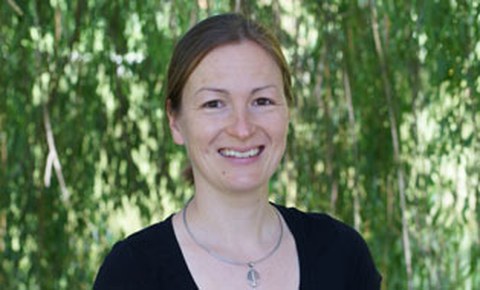Dr. Christiane Helbig
Forschungsschwerpunkte
- Steuerung und Regulation von heimischen und nichtheimischen Borkenkäfern und deren Antagonisten
- Strategien eines naturnahen Waldschutzes
- Schadorganismen und Schadensmanagment in Kurzumtriebsplantagen
- Carabidae
Lehrschwerpunkte
- Waldschutzformenkenntnis
- waldschutzrelevante Curculionidae
- invasive Waldschadorganismen
- Waldschutzforschung
Curriculum Vitae
| 2021–heute | Wissenschaftliche Mitarbeiterin an der Professur für Waldschutz im Haushalt mit Lehrtätigkeiten in den Modulen FOBF19, FOBF37, FOBF41, FOBF47, FOBF49, FOMT2.4 und UWFMF13 |
| 04/2022 | Verteidigung der Dissertation mit dem Titel "Schadinsekten in Kurzumtriebsplantagen mit Pappeln, Weiden und Robinie in Sachsen und Südbrandenburg", Abschluss als Doctor rerum silvaticarum |
| 2015–2023 | Wissenschaftliche Mitarbeiterin an der Professur für Waldschutz in den Projekten bioProtect (Entwicklung und Implementierung biotechnischer Verfahren der insektizidfreien Borkenkäferregulation durch Nutzung und Steuerung natürlicher Borkenkäferantagonisten) und ReBek (Entwicklung leistungsfähiger und naturnaher Regulations- und Bekämpfungsverfahren als Voraussetzung für eine nachhaltige und zukunftsfähige Waldbewirtschaftung) |
| 2013–2014 | International Research Scholar an der University of Georgia, D. B. Warnell School of Forestry and Natural Ressources im Projekt "Southern Pine Health" |
| 2006–2013 | Wissenschaftliche Mitarbeiterin an der Professur für Waldschutz in den Projekten AGROWOOD (Anbau, Ernte und Verwertung schnellwachsender Baumarten auf landwirtschaftlichen Flächen) und CultPop (Cultivation of Poplar on Former Sewage Farms) |
| 2004–2006 | Laufbahnausbildung für den höheren Forstdienst in Mecklenburg-Vorpommern inklusive vierwöchiger forstlichen Studienreise durch Dänemark, Schweden, Estland, Lettland und Litauen und Großer Forstlicher Staatsprüfung, Abschluss als Assessorin des Forstdienstes |
|
1998–2003 |
Studium der Forstwissenschaften an der TU Dresden, Diplomarbeit mit dem Titel "Untersuchungen zum Einfluss kleinflächiger Vorkommen der Rotbuche (Fagus sylvatica L.) auf epigäische Arthropoden in Beständen der Gemeinen Fichte (Picea abies [L.] KARST.)" an der Professur für Waldschutz, Abschluss als Diplom-Forstwirtin |
Publikationen
Ausgewählte Veröffentlichungen
- Heber T., Helbig C. E., Osmers S., Larquette M., Müller M. G. (2024): Evaluation of trap type and attractant composition for potential mass trapping of Hylobius abietis. Agricultural and Forest Entomology 26 (1): 1-17.
- Heber T., Helbig C. E., Osmers S., Müller, M. G. (2021): Evaluation of attractant composition, application rate, and trap type for potential mass trapping of Ips typographus (L.). Forests 12 (12): 1727. DOI: 10.3390/f12121727.
- Helbig C. E., Müller M. G., Landgraf D. (2021): Effects of leaf loss by artifical defoliation on the growth of different poplar and willow varieties. Forests 12 (9): 1224. DOI: 10.3390/f12091224.
- Helbig C. E., Coyle D. R., Klepzig K. D., Nowak J. T., Gandhi K. J. K. (2016): Colonization dynamics of subcortical insects on forest sites with relatively stressed and unstressed loblolly pine trees. Journal of Economic Entomology 109 (4): 1729-40. http://dx.doi.org/10.1093/jee/tow083.
Ausgewählte Buchbeiträge
- Georgi R., Helbig C., Müller M. (2013): Biotische und abiotische Schäden in Kurzumtriebsplantagen. In: Bemmmann A., Butler Manning D. (Hrsg.): Energieholzplantagen in der Landwirtschaft. Eine Anleitung zur Bewirtschaftung von schnellwachsenden Baumarten im Kurzumtrieb für den Praktiker. 1. Aufl. Clenze: Agrimedia: 42–48. ISBN: 978-3-86263-081-3
- Helbig C., Müller M. (2010): Naturale Risiken und Grundzüge des Schadensmanagements in Kurzumtriebsplantagen. In: Bemann A., Knust C. (Hrsg.): Agrowood. Weißenseeverlag Berlin, 74-87.
- Helbig C., Müller M. (2010): Habitatqualität von Kurzumtriebsplantagen für die epigäische Fauna am Beispiel der Laufkäfer (Coleoptera, Carabidae. In: Bemann A., Knust C. (Hrsg.): Agrowood. Weißenseeverlag Berlin, 147-152.
- Helbig C., Müller M. (2009): Abiotische und biotische Schadfaktoren in Kurzumtriebsplantagen. In: Reeg T., Bemmann A., Konold W., Murach D., Spieker H. (Hrsg.): Anbau und Nutzung von Bäumen auf landwirtschaftlichen Flächen. Wiley-VCH, Weinheim, 83-97.
Ausgewählte internationale Vorträge und Poster
- Options for an insecticide-free management of the black stem borer, Xylosandrus germanus, a non-native bark beetle in Germany. Poster. 27th International Congress of Entomology: New Discoveries Through Consilience. 25.-30. August 2024. Kyoto, Japan.
- Interference in bark beetle host selection: Effects of allochthonous kairomones, anti-aggregation substances and non-host volatiles on bark beetles and their antagonists. Vortrag. IUFRO Joint Meeting: Global Challenges and Innovative Management of Bark and Wood Borers in Planted Forests. 29.-31. August 2023. Bordeaux, Frankreich.
- Biology and management of buprestids on broadleaf tree species in Germany: Agrilus biguttatus on oak and A. viridis on beech. Vortrag. 2018 ESA, ESC and ESBC Joint Annual Meeting: Crossing Borders - Entomology in a Changing world. 11.-14. November 2018. Vancouver, Kanada.
- The good, the bad, and the smelly: using allochthonous kairomones as an insecticide-free option in bark beetle management. Vortrag. IUFRO Joint Meeting: Forest Insects and Pathogens in a Changing Environment - Ecology, Monitoring and Genetics. 11.-15. September 2017. Thessaloniki, Griechenland.
- Attraction of bark and woodboring insects to loblolly pines as based on tree health. Vortrag. 25th International Congress of Entomology: Entomology Without Borders. 25.-30. September 2016, Orlando/FL, USA.
- Rhizophagous weevils – primary or secondary pests on loblolly pine? Vortrag. 56th Annual Southern Forest Insect Work Conference. 22.-25. July 2014. Charleston/SC, USA.
- Insect pests in SRC in Germany – an overview of their effects, risk potential and control measures. Vortrag. Final International BENWOOD Conference: Short Rotation Forestry and Agroforestry - an Exchance of Experience between CDM Countries and Europe. 20.-22. Juni 2011. Barolo, Italien.

